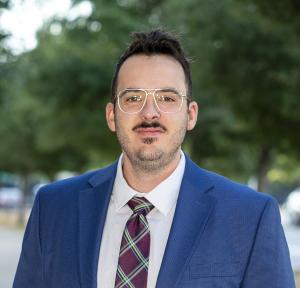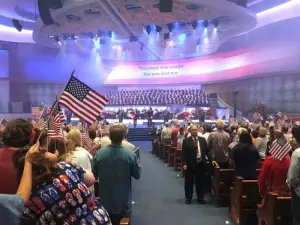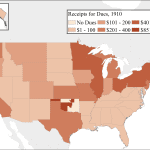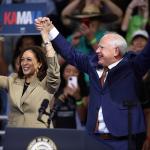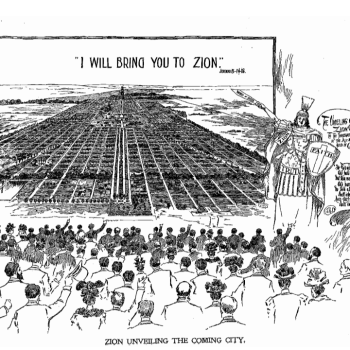In a recent, already field-defining, essay in the Journal of the American Academy of Religion, historian Matthew Avery Sutton offers a historiography of American evangelicalism. As he explains: In the1980s, in response to the rise of the Religious Right, prominent religious historians occupying influential chairs and possessing access to institutional resources, cultivated a historical “consensus” that defined evangelicalism broadly, abstractly and optimistically, and created an unbroken lineage of both orthodoxy and orthopraxy throughout American history. However, Sutton argues, this imagined evangelical consensus, (which was subsequently adopted by many prominent secular historians largely ignorant about religion who “deferred to the experts”) was accomplished only by “decoupl[ing] the movement from politics, race, class, gender and sexuality.” A more accurate historical accounting reveals that there is, in fact, “no multi-century evangelical throughline.” Rather, Sutton writes, antebellum evangelicalism is a misnomer–“so elastic you could stretch it to eternity” while post World War II evangelicalism is best understood as a “religio-political coalition”: “a white, patriarchal nationalist religious movement made up of Christians who seek power to transform American culture through conservative-leaning politics and free-market economics.” While generous to the consensus historians, Sutton’s essay helpfully dismantles their project, creating space for rearrangement and reconsideration, both historical and theological.
There’s a lot to analyze! So for the next couple of weeks, Jake and I are going to think through “Redefining the History and Historiography on American Evangelicalism in the Era of the Religious Right” and its implications together, approaching the conversation from different disciplines and contexts. If you missed it, here’s last week’s conversation. We hope you enjoy this one and join in on social media and in the comments.
JR: Ansley, to begin with, let me ask you about your engagement with the “consensus” historiography in your own work. How has the work of Marsden, Noll, Hatch, Stout and others figured into your own scholarly formation? Does Sutton’s assessment shift your big-picture perspective on American evangelicalism?
OK, so this is where right off the bat I have to admit I’m not a real religious historian. I didn’t go to Wheaton or to Notre Dame. And while I read some of these texts for my comprehensive exams, they were not intellectually formative for me, with the exception of The Civil War as a Theological Crisis, which absolutely was. But I think that book actually undermines the consensus school. Part of the reason why maybe I did not engage as much with this literature is also that I’m from the South. And I write about the South. And it just never really worked for us. We’re too messy.
So I’m not sure that Sutton’s perspective shifted something for me fundamentally, but it did clarify a great deal. In some ways, it’s completely understandable that in the moment of the Religious Right’s initial ascendance, faithful evangelical scholars looked for a good usable past. These were (white) men who occupied prominent and privileged positions and from them, and with what they had–tremendous historical and narrative skill, wanted to do something to defend their tradition from co-optation. But their fidelity to evangelicalism also encouraged them to make strained connections, to smooth over unevenness, and to leave out or push out unsavory actors and ideologies. That sort of clear historiographical analysis is humbling (for all historians, I think) and illuminating. We’re all writing from our moments, and with certain (acknowledged and unacknowledged) missions.
JR: If real religious historians only go to Wheaton or Notre Dame, a lot of us are in trouble! Maybe our next series should be “Who is a Real Religious Historian”! In all seriousness, I appreciate your attention to how our own social location can be both an asset and a detriment to telling nuanced stories. One of the ways Sutton disrupts the histories told by the consensus is by problematizing evangelicalism as a mainly Northern US phenomenon. A lot of your work focuses on race in American religion, and particularly civil rights activism in the American South. How does the evangelical story figure into your own ideas about race and Southern religion in the mid-to-late twentieth century?
In the American South, it is impossible to separate race and religion. It just is, from The Baptism of Early Virginia to White Evangelical Racism. What I found in writing about the theological struggle inherent in the civil rights movement was that white evangelicals did rely on certain theological moves when it suited their political aims. (You could also argue, perhaps too generously, that their political moves stemmed from these theological beliefs– as they often did.) Literal reading of the Scripture was a favorite, so white segregationists knew chapter and verse on when the Israelites were told to remain distinct from their neighbors. They knew these as their grandfathers had known the litany of slavery’s appearances in the text. Defenses of slavery and then segregation became defenses of a literalist reading, of true evangelical belief as opposed to modernism, of the Bible, of orthodoxy. Luke Harlow makes this case strongly in his essay “The Civil War and the Making of Conservative American Evangelicalism,” when he says, “To question slavery was to question everything. It meant questioning divine revelation.”
Noll et. al might say these were bad evangelicals but that would be a political distinction not a theological one, according to his definition. Meanwhile, Black Christians are often left out of understandings of “evangelical,” as you noted, but many would qualify under Bebbington’s or whatever other elastic definitions exist. This kind of gives away the game, which is why I was glad to see Matthew state it so plainly.
Black Christians have always practiced religion(s) with an acute awareness of politics and nation and community. They did not, generally, have the luxury of abstraction. As the great Howard Thurman put it, the question was: What do “the teachings and the life of Jesus have to say to those who stand, at a moment in human history, with their backs against the wall?” (Emphasis mine). In the civil rights movement, folks organized in churches, where they: quoted the Scripture, put Christ on the cross and took him down, called for a rebirth of American democracy, and got in lines to march. Many Black Christians, then, are, and have been, evangelicals, by any consensus definition. That they’re traditionally not included reveals a lot about the political project that has long been at the heart of that religio-nationalist movement.
JR: You talked just a bit ago about the “luxury of abstraction.” I think that luxury can be employed to problematic ends with history as much as religion. So let’s play with that and narrow in a bit more. Much of your past research homes in on religion and politics in Georgia, and especially small-town Georgia. Sutton is dealing with a broad stream and a large cast of characters. Are there things historians miss when we are content with the bird’s eye view of a religious movement like evangelicalism? In other words, does the added granularity of focusing on local places and people challenge national or larger regional histories?
Yes and yes. What a good question. Absolutely. While we need big national and global narratives, they necessarily generalize. What microhistory offers us is specificity, which tends to complicate and confound. All people have stories and experiences and hidden motivations that make them, individually, a “bundle of contradictions.” Communities, too, are more interesting up close. Even the most archetypal place will have its own unevenness and peculiarity. In Americus, for example, I was considering, say, white Methodism, but had to also grapple with a specific Rev. Robertson who was sympathetic to civil rights, even as his church leadership barred Black worshippers. His theological crisis did not quite fit the conglomerate portrait of white southern evangelical ministers upholding segregation. So, sometimes local stories challenge larger national or regional trends; sometimes they follow them. But either way, I find the stories more compelling up close.
JR: You asked me last time about theological definitions. Given your research interests, which are quite different from my own, what’s your take on providing a theological definition for evangelicalism?
Whew, I have to punt on this one. I tend to agree with Matthew that evangelicalism is more of a historical/political category than a theological one at this point. Not that there’s nothing theological about it, but that those who identify with evangelicalism might not hold any of the same priors anymore, especially when you consider the rise of Pentecostalism and New Apostolic Reformation ideas in the space. I’ll leave the lumping and splitting to the theologians!
JR: Fair enough! I just wanted to put you on the hot seat for a moment. Okay, just a couple more. The focus on power in Sutton’s reappraisal is compelling to me. He asserts that at its core, post-WWII evangelicalism is about consolidating social capital and political power. Power is certainly mixed into the evangelical recipe, but is it the main ingredient?
I would say it is. Post World War II, in the Cold War context in particular, Christianity interacted with capitalism and foreign policy/commodities, and ideas about American exceptionalism and dominance in important ways. Over time, as denominational and theological distinctions receded and racial and political demarcations became more prominent, especially in the American South, evangelicalism started to serve as a code for a certain type of worldview. Isaac Sharp does a wonderful job of showing how this happened over several decades. And these folks, wielding incredible institutional power, like the National Association of Evangelicals that Sutton mentions, insisted on a nation in their image: accumulating capital that could influence elections, stacking courts, writing curriculum, and criminalizing and punishing those outside of their bounds.
A more positive answer is that most evangelicals believe the gospel is powerful. They think following Jesus is good for individuals and society and promotes flourishing. They believe they have the power of the Holy Spirit, that God is active in human events, that they can participate in the redemption of society and the saving of souls. That’s a sort of power, too. If only evangelicals today remembered the good power they believe they have instead of relying on the Faustian bargain they’ve made for a power that won’t last, a power that will only weaken their witness.
(First Baptist Church, Dallas)
JR: So you find the political aspect of evangelical identity to have more explanatory power than any theological aspect. Let me push back on that for just a minute. I think some–many–evangelicals might be skeptical. Many, I assume, think of themselves primarily as religious actors motivated by religious interests. You can imagine if one did an oral history interview with, say, James Dobson or another evangelical mover about their work and ministry, they might very likely reject the notion they were motivated by self-interest or political intrigue. Or for the people in the pews, they may see their votes and activism as essentially motivated by the demands of the gospel. What role if any does evangelicals’ self-understanding play in the evangelical story?
I love this pushback. After all, I wrote a whole book about lived theology and the need for historians to take theological commitments seriously! So yes, I think that while some evangelicals will openly claim racist or nationalist or patriarchal politics, others would eschew those positions. Both of these groups would probably claim to be motivated by religious priors, namely a simple reading of the Bible and the advancement of God’s kingdom. And that self-understanding is really, really important. You’re not engaging in politics, you’re redeeming the nation; you’re not harming women, you’re protecting God-sanctioned gender roles. I believe now even Robert Jeffress, the First Baptist Dallas pastor who commissioned a “Make America Great Again” hymn, told Tim Alberta that he wasn’t engaging in politics but was sharing the gospel and pushing back evil.
So truth be told, it can be difficult to tell what’s driving– theological commitments or political positions? We all have to ask ourselves this if we are to operate with any intellectual humility. What can be helpful is the contractions. If all people are made in God’s image, and we will fight for some and not others, that might be a good indication, say. It’s also true that even if we have genuine theological commitments and beliefs, we are not existing in timelessness–we make ethical decisions in time and place. And it’s hard! But we get to keep asking if we are wrong, we get to repent and confess and be forgiven and begin again. But when evangelicals refuse to do that, when they double-down on certain partisan positions, I think they tell on themselves and we see a bit of what’s driving what. When I talk to postwar-evangelicals about race, for instance, I always tell them that they of all people should be able to unflinchingly and unsparingly tell the whole truth. They have the theological and spiritual power to have been totally wrong! And to be forgiven and loved and to go on and do better in the big ole invisible communion of the saints. But if they can’t or won’t, that’s telling. So I don’t know which aspect in more important for individual evangelicals, but I think Sutton is right about evangelicalism as a movement. After all, we will know by the fruit.
JR: “We get to keep asking if we are wrong…” A beautiful aspect of the Christian religion and the historian’s vocation, no? Ansley, it has been so fun to think through these questions with you, and especially to learn from you this week. Let’s do it again soon!


